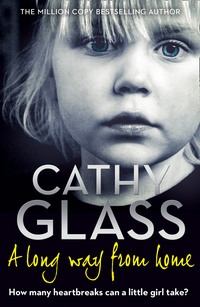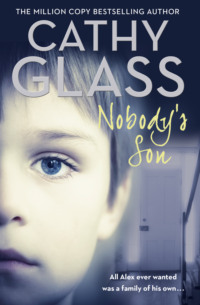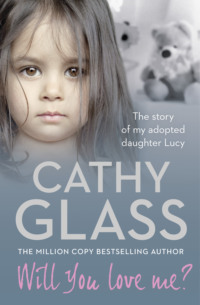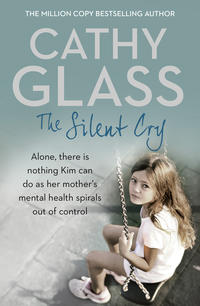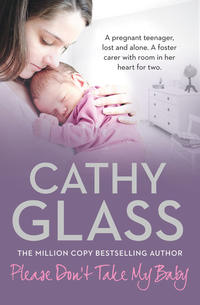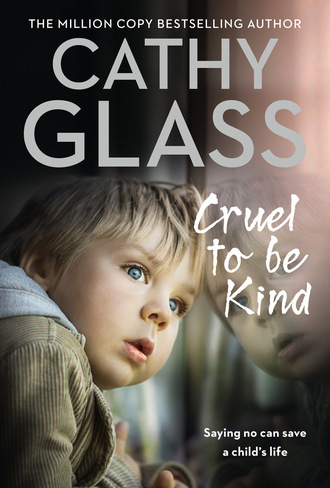
Полная версия
Cruel to Be Kind
He nodded, and we returned downstairs. Jo went briefly into the living room to fetch her bag and then joined us in the hall to say goodbye. ‘His inhaler is in his school bag,’ she reminded me. Then to Jill and me, ‘I’ll phone about the issues we discussed.’
‘Thanks,’ Jill said.
Jo said goodbye to Max and left. Jill, Max and I returned down the hall and Jill went into the garden to say goodbye to Adrian and Paula, while Max flopped onto the sofa. ‘I’m hungry,’ he said again, this time with a little groan.
‘So am I,’ I said. ‘We’ll eat as soon as Jill has gone.’ It was nearly six-thirty, later than we usually ate, and I knew Adrian and Paula would be hungry too.
Jill came in from the garden. ‘Well, have a good evening then,’ she said to Max. He stayed on the sofa while I saw Jill to the front door. ‘I’ll phone you tomorrow to see what sort of night you’ve had,’ she said. ‘If you need to speak to someone tonight, phone our out-of-hours number.’ I doubted I would with Max, but it was reassuring to know that twenty-four-hour support was always available from the agency if necessary.
Having said goodbye to Jill, I returned to the living room to check on Max, and as soon as he saw me he told me again that he was hungry. ‘We’ll have dinner now,’ I said. ‘While I dish it up, would you like to go into the garden and tell Adrian and Paula dinner is ready?’ I could have called them myself through the open patio doors, but I find that if a child is involved in the routine of the house, they feel included and settle more quickly.
Max was happy to oblige and hauled himself off the sofa, while I went into the kitchen. Taking the oven gloves from their hook, I opened the oven door and carefully lifted out the piping-hot casserole. I set it on the work surface and began dishing it onto four plates. The children appeared and I asked them to wash their hands at the sink before dinner. I finished dishing up and returned the rest of the casserole to the oven, then went to the table and suggested to Max that he might like to sit next to Adrian. We tend to keep the same places at the meal table. ‘I’m hungry, Mum,’ Adrian said as they sat down, rubbing his tummy theatrically.
‘So am I,’ Max agreed, copying him with a rub of his tum.
I carefully carried the plates of food in from the kitchen and set them in front of each child. I added a basket containing chunks of warm baguette to the centre of the table and told them to help themselves. By the time I’d sat down with my plate Max had taken three large chunks of bread, which he propped on the side of his plate. ‘There’s plenty,’ I said, for I wondered if he thought I might run out. I’d fostered children before who’d been so underfed at home that they grabbed and hoarded food whenever the opportunity arose, although I didn’t think this was true in Max’s case – it seemed to be more habit.
We all began eating and for a while all that could be heard was the chink of cutlery on china as three hungry children ate. When a child first arrives mealtimes can sometimes be awkward for them. Eating is an intimate and social occasion, with unspoken but assumed rules that can differ from household to household. I didn’t even know if Max ate at a table at home; many children don’t. And sitting close to people you’ve only just met can be embarrassing and make you feel self-conscious. I’d looked after children who felt so uncomfortable to begin with that they ate next to nothing for the first few days, and it’s very worrying. Max showed no sign of being self-conscious, though, and ate confidently and heartily, mopping up the last of the gravy with another chunk of bread he took from the basket. Adrian finished at the same time and asked if there were seconds. He knew there would be.
‘Yes, of course,’ I said. I stood and picked up his plate. ‘Max, would you like a second helping too?’
‘Yes, please,’ he said, and passed me his plate. Paula and I were still finishing ours.
I carried the plates to the kitchen, dished up seconds and also cut up some more bread, which I placed in the basket.
‘Thank you,’ Max said as I set his plate in front of him. He took some more bread, as did Adrian, and we all continued eating.
Paula is a bit of a slow eater and was still working on her first helping as both the boys came to the end of their second. Adrian sat back with a sigh of contentment and, patting his stomach, said, ‘I’m stuffed.’
‘Full,’ I corrected.
Max was looking at me expectantly. ‘Is there any more?’ he asked.
‘There is a little. But leave some room for the ice cream you wanted.’
‘I’ve always got room for ice cream,’ he said, with a small smile. It was a passing reference to him being overweight, but I didn’t comment. I checked with Paula that she didn’t want any more and then with mixed feelings spooned the last of the casserole onto Max’s plate.
‘Thank you,’ he said. He began eating with the same urgency as he had the first serving, although I couldn’t see how he could still be hungry.
Feeding one’s family is laden with emotion unconnected with the food itself. As well as providing sustenance, cooking is a labour of love, and while I was pleased Max was enjoying the meal I’d made, I wondered how much of a disservice I was doing him by allowing him a third helping and all that bread, given his obesity. Wouldn’t it have been kinder – and better for his long-term health – to refuse him a third helping and limit the amount of bread he’d eaten? But as this was his first meal with us I didn’t think it appropriate to do so now, as it would have drawn attention to his need to diet. Similarly, when Max finished his main course and asked if it was time for the ice cream now, I said yes and dished it up. Two scoops for each child, but I didn’t offer second helpings.
By the time we’d finished eating it was after seven o’clock and time for Paula’s bed. I usually took the children up to bed in age-ascending order, so Paula, the youngest, would go first, then Max and Adrian. I explained to Max it was Paula’s bedtime and asked him what he usually did at home in the evening before bed. I try to follow the routine the child has been used to at home as much as possible to minimize the disruption. Max said he read his book and it was in his school bag.
‘Excellent,’ I said. ‘Adrian enjoys reading too. Perhaps you’d both like to sit in the living room and read while I take Paula up?’
Both boys fetched their school bags from the hall, sat side by side on the sofa and took out their reading books.
‘What are you reading?’ Adrian asked Max, interested.
‘James and the Giant Peach,’ Max said, showing him the front cover of the children’s classic. It was quite advanced for the average six-year-old; Adrian, older, had read it earlier in the year.
‘Are you enjoying the book?’ I asked Max.
‘Yes. I like Roald Dahl.’
‘So do I,’ Adrian said, turning to him enthusiastically. ‘James’s aunts, Spiker and Sponge, were horrible to him,’ he added, referring to James and the Giant Peach. ‘I’m glad he got away from them.’
Max agreed.
‘Have you read Charlie and the Chocolate Factory?’ Adrian asked.
‘Not yet, but I’ve read George’s Marvellous Medicine, and The Twits.’
‘The Twits is so funny,’ Adrian laughed. And so they began a discussion about Roald Dahl books.
They paused to say goodnight to Paula and we left them sitting on the sofa, discussing books and with the still-warm evening air drifting in through the open patio doors. I was pleased Max liked reading. I try to interest all the children I foster in books – with varying degrees of success – but Max was one of the few children who’d arrived with a passion for them. It was only later I discovered that there was another, more disturbing reason for him wanting to escape into books.
Chapter Five
Restless Night
While I was upstairs helping Paula get ready for bed I left her in the bathroom brushing her teeth for a few minutes and went into my bedroom to find some more pyjamas for Max. I took all the large sizes of pyjamas from the ottoman, holding them up as I went to see if they would fit him. Usually I’m quite good at judging a child’s size, but in Max’s case I had absolutely no idea. The ones that had 8–9 years old on the label seemed too long in the leg but not wide enough around the middle. The next size up, 10–11, seemed ridiculously big for a six-year-old, and 12–13 was gigantic. I couldn’t decide, so I carried them all into Max’s room for him to try on at bedtime, and removed the pair I’d previously put out.
Paula, having finished in the bathroom, was ready for a bedtime story and I went with her to her bedroom, where she chose a book from her bookshelf before climbing into bed with a yawn. I lay beside her, my arm around her shoulders and my head propped on the headboard as I read the story she’d chosen. When I’d finished she snuggled down beside me, ready for our usual cuddle and chat – part of her bedtime routine – before she went to sleep. Unsurprisingly, tonight she wanted to talk about Max.
‘How long will Max stay with us?’ she asked, kissing my cheek.
‘I don’t know yet, love. Until his mother is well enough to look after him again.’
‘Does he miss his mummy?’
‘I should think so, but he’ll see her tomorrow at the hospital.’
‘He’s not crying like some children do.’
‘No, he’s been very brave, but I expect he’s thinking lots about her and his family.’
‘I’d cry if I couldn’t live with you,’ Paula said, snuggling closer.
‘But that’s not going to happen, is it?’ I reminded her. ‘If I had to go into hospital, Nana and Grandpa would come and look after you and Adrian. You know that.’ Since my husband had left, comments and questions like this came up from time to time – from Paula and Adrian. Understandably they both felt a degree of insecurity with just one parent at home, and I always reassured them as best I could.
‘Do you think Max eats too much?’ Paula now asked with the candidness of a young child.
‘Possibly.’
‘He’s very big, isn’t he? I don’t mean tall like big boys – his body is very round.’
‘I know, but you wouldn’t ever say that to him, would you?’ I hoped that Adrian at his age had developed the necessary self-regulatory skills to stop him saying hurtful truths, but at Paula’s age children are still highly impulsive and simply say what comes into their head without considering the consequences. Paula shook her head.
‘Good. Because I’m sure Max knows he’s overweight and he’d be very upset if you said anything.’
‘Are you going to stop him eating so much?’ she now asked.
‘I might, we’ll see how it goes.’
‘I hope you do, then he can ride the bike.’
‘OK, love,’ I said, drawing the conversation to a close. ‘We’ll see. But in the meantime you can play other games with Max. Try to look beyond his size to the person within. I think he’s a lovely boy, kind and gentle.’
‘Yes, so do I,’ Paula agreed. ‘I promise I won’t look at his big tummy but inside him.’
‘Good girl.’
I kissed her goodnight and came out of her room, leaving her bedroom door slightly open so that I could hear her if she called out. Downstairs, both boys were still on the sofa, now talking about football and with their books open on their laps. I wasn’t sure if they’d done much reading, but it didn’t matter. They were getting along well and Max seemed relaxed. I was also pleased he hadn’t needed his inhaler since he’d first arrived and his voice sounded far less husky. I hadn’t heard from Jo about phoning his mother that evening, and as it was now getting late I rather assumed she wouldn’t be in touch, as Caz was seeing him the following evening.
‘Max, I think it’s time for you to go to bed,’ I said. ‘What time do you normally go to bed at home?’
He shrugged. ‘Any time, really. I go to my room and lie on my bed and read. Sometimes I fall asleep with my clothes on.’ This didn’t sound like a very good bedtime routine.
‘When do you have your bath or shower?’ I asked.
He shrugged again. ‘When the bathroom is free. Sometimes I have a bath at the weekend.’
‘So the last time you had a bath was last weekend?’ It was Wednesday now.
‘Maybe, or the weekend before. I can’t remember.’
‘OK. Don’t worry. Would you like a quick bath now?’
He nodded.
I always encourage the children I foster to bath or shower every day, as good personal hygiene is obviously important, especially in the warm weather when we all sweat more. However, I’d never insist on it on their first night after the trauma of coming into care. Arriving at a stranger’s house and having to take off all their clothes for a bath or shower could seem like another form of abuse for an already abused child, and so often carers don’t know all the child’s history. Max was happy to have a bath though, and I went upstairs with him to run it. I asked him if he usually had help with his bathing and he said he didn’t, so I said I’d wait just outside the bathroom door while he had his bath and he should call if he needed me. I’d never leave a six-year-old completely unattended in the bath (or shower) in case they slipped and fell, but I always try to give the child age-appropriate privacy. I heard the water splash as he washed himself and after a few minutes I called out, ‘Are you OK, Max?’
‘Yes,’ he returned. Then, a few moments later, ‘I’ve finished.’ It was a quick bath, but it would do for tonight.
‘Good boy. Can you get out now and dry yourself?’ I asked.
‘Yes.’
‘Then put the towel around you. I’ve put pyjamas in your bedroom for you to try on.’
A few minutes later he appeared cloaked in the towel and we went to his bedroom, where I told him to choose the pyjamas that fitted best while I put his school clothes in the wash so they were ready for tomorrow. Leaving him in his room trying on the pyjamas, I returned to the bathroom, gathered up his clothes and took them downstairs, where I set them to wash and dry in the machine. I looked in on Adrian in the living room, who was now reading, and I then returned upstairs. Max was still in his bedroom and I knocked on the partially open door. ‘Have you got some pyjamas on?’
‘Yes, but they’re very long.’
The door opened and Max stood in front of me looking slightly comical with his hands and feet enveloped by the pyjamas. However, while the sleeves and legs were far too long, the set he’d chosen fitted around his middle. They were the largest pair, age 12–13 years, and another indication of just how overweight Max was. Clothes designed for a child twice his age fitted.
‘Let’s roll up the sleeves and legs for tonight,’ I said, going into his room. ‘I’ll take them up properly tomorrow.’
‘Mum cuts them off,’ he said. He held out one arm for me to roll up and then the other. I did the same with his pyjama legs.
I could imagine it must be virtually impossible to buy clothes off the rail that would fit him, and his mother would doubtless have to adapt all his clothes. I returned to the bathroom with Max so he could brush his teeth, then I called down to Adrian that the bathroom was free. I would try to establish a better routine tomorrow that allowed time for the boys to do any homework they might have. However, I thought Adrian might have to take his with us to the hospital to do there, as we were going to be very short of time on school days. Thankfully this evening, apart from reading, which most school-age children are expected to do every day, neither Adrian nor Max had any homework.
On the first night I always ask the child I’m looking after how they like to sleep: if they like the curtains open or closed, their light on or off, and the bedroom door open or shut. These small details, which we do automatically for ourselves and our children, help the child to settle in a strange room. Max wanted his curtains slightly parted as many children do. He was happy to sleep with the light off and said he had his door closed at home so he didn’t get woken by the noise his sisters made.
‘It’s quiet at night in our house,’ I reassured him. ‘Adrian and Paula will be asleep too, and when I come up to bed I’m very quiet, so I won’t wake you.’
‘I wish I had Buzz,’ Max said as he climbed into bed, referring to his favourite toy.
‘Jo is going to ask your sisters to pack it, so you should have it tomorrow night,’ I reminded him. Then I had a thought. ‘Just a moment. Stay there.’
I left his room and went round the landing and knocked on the bathroom door. ‘Adrian, could Max borrow your Buzz Lightyear? Just for tonight.’ Like many children, he had a collection of Toy Story toys.
‘Yes,’ he called. ‘It’s in the cupboard in my room.’
‘Thank you.’
I went into Adrian’s room and to the small built-in cupboard, which contained many of his toys. Buzz sat next to Woody on one of the shelves and I carefully lifted him down. I carried him into Max’s room and his eyes lit up. ‘Buzz!’
‘Adrian said you can borrow his for tonight. Where would you like him to sit?’
‘Just here,’ Max said, patting a place on the bed beside him.
I positioned the toy as Max wanted and then asked him if he needed anything else. He shook his head.
‘Goodnight then, love. Sleep well. Would you like a goodnight kiss?’ I always ask the child – for while a kiss is a sign of affection, it’s also an invasion of their personal space and can make them feel uncomfortable – apart from babies and toddlers, whom I kiss and cuddle spontaneously and often.
‘Don’t mind,’ Max said.
‘Does your mum kiss you goodnight?’ I asked.
‘No. She watches television when I’m in bed.’
‘OK. Night, love.’ I kissed his forehead, and reminding him again to call me if he needed me in the night, I came out, drawing his door to behind me.
Adrian had finished in the bathroom now and was in bed, waiting for me to say goodnight. I lay beside him and we had our usual hug and chat, which tonight was mainly about school and the long summer holidays that would start at the end of the month. A quarter of an hour later I kissed him goodnight and left him to go to sleep. I checked on Max and Paula, who were both fast asleep, and went downstairs where I tidied up. Then, with a cup of tea and my fostering folder, I sat on the sofa in the living room and began writing up my log notes. Foster carers are required to keep a daily record of the child or children they are looking after, which includes appointments, the child’s health and wellbeing, education, significant events and any disclosures the child may make about their past. When the child leaves this record is placed on file at the social services. As I worked the phone suddenly rang and I quickly snatched it up, hoping it hadn’t woken the children. It was nine forty-five, rather late for a friend to be phoning for a chat, as most of my friends had young children.
‘It’s Caz, Max’s mother,’ she said, clearly annoyed. ‘I thought Max was supposed to phone me.’
‘I’m sorry. I was under the impression Jo was going to phone me with the arrangements after she’d spoken to you.’
‘And she didn’t?’
‘No. I expect something came up and it slipped her mind.’ I heard her tut. ‘Max is fine,’ I reassured her. ‘He ate a good dinner, had a bath and is now in bed asleep.’
‘So I can’t speak to him if he’s asleep.’
‘I’d rather not wake him, if you don’t mind. I’m sorry. It was getting late and with school tomorrow I thought he should go to bed.’ In fairness to Caz, she had a right to be annoyed; she’d been expecting Max to phone her and due to a breakdown in communication, he hadn’t. I was now expecting a rant, but she said, ‘OK. Tell him I phoned. Goodbye.’ And the line went dead.
A little unsettled and concerned that we hadn’t got off to the best start – again – I picked up my pen and finished writing my log notes. Then I read the essential information forms, noting where Max’s school was. A little before ten-thirty I returned the folder to the locked drawer in the front room, put Toscha to bed and went up myself. I checked on the children, who were all asleep, and then washed and changed and got into bed, leaving my bedroom door open so I could hear the children if they woke.
I never sleep well when there is a new child in the house. I’m half listening out in case they wake, frightened, not knowing where they are and needing reassurance. With Max there was the added worry that he might need his inhaler in the night. He hadn’t needed it all evening so I was hopeful he’d have a good night. I’m a light sleeper and would hear him if he was restless. His inhaler was in his school bag in the hall and I could easily pop down and get it if it was needed. Jo was going to find out more about Max’s condition and the directions his mother had been given regarding when the inhaler was to be used. If his mother had stayed on the line a little longer and had been less hostile, I could have discussed it with her. In the meantime I would use my judgement and common sense. All foster carers have first-aid training and I’d fostered children before who’d arrived with inhalers.
During the night I was repeatedly woken by Max, not because he was frightened or needed his inhaler, but because of his snoring. I’d never heard a child snore so loudly. In the still of the night, with the bedroom doors open, it echoed along the landing, creating a rhythm of its own. Beginning with some snorts and grunts, it rose with each breath to a crescendo, and then there was a short silence before it began again. I was so concerned he would wake Adrian and Paula that I closed their bedroom doors. Each time I went into Max’s room he was flat on his back, fast asleep, mouth open and snoring heavily through his nose, although his chest sounded clear. He wasn’t too hot and the room was well ventilated, so there was nothing I could do. If I tried to move him onto his side, which might have helped, I ran the risk of waking him with a start. I knew that snoring could be linked to a number of medical conditions and I would raise it with Jo when we next spoke.
At six o’clock, with very little sleep, I was out of bed earlier than usual to begin our new school routine. I showered and dressed, brewed coffee, fed Toscha and let her out for a run. Then at seven o’clock I returned upstairs to wake the children.
‘Did you hear Max snoring?’ Adrian asked me as soon as he was awake. His room was right next door to Max’s.
‘Yes. I hoped you hadn’t been disturbed,’ I said, concerned.
‘It’s OK. I wondered what it was to begin with, but when I realized it was Max snoring I went back to sleep.’
‘Good.’
Paula didn’t appear to have heard anything, and when I asked Max if he’d slept well, he said, ‘Yes. It’s quiet in this house, like you said.’ Not for me, I thought.
‘Do you know you snore?’ I asked him lightly as I placed his freshly laundered clothes on his bed.
‘Yes. My sisters say they need earplugs.’
I smiled and left it at that. There was nothing Max could do about his snoring, and I didn’t want him to feel embarrassed by it. I asked him if he needed any help dressing, although I was pretty sure he didn’t, as he seemed to have good self-care skills. However, children can panic in an unfamiliar setting if they are asked to do something they are not capable of. It’s a horrible feeling and one I can remember from being a small child at school. I’d been asked by my teacher to deliver a message to a teacher in another classroom. This was a responsibility coveted by the class and I felt proud to have been chosen. But once outside the classroom I realized I didn’t know where the other teacher’s room was and I panicked. Instead of going back into the classroom and asking where I had to go (and feeling a bit of a fool), I began wandering around the two-storey building, hoping I would stumble across the correct classroom. I didn’t, and I must have been gone for a long time, for eventually two other children from my class were sent to find me, and they then helped me deliver the message. Of course I felt silly and self-conscious when I returned to the classroom, as everyone knew I’d got lost. With this in mind, I never assume a child can do something or knows something, even if it is obvious, until I am certain they are up to the task. We all acquire skills at different rates and it’s crushing to have one’s lack of knowledge highlighted through failure.


